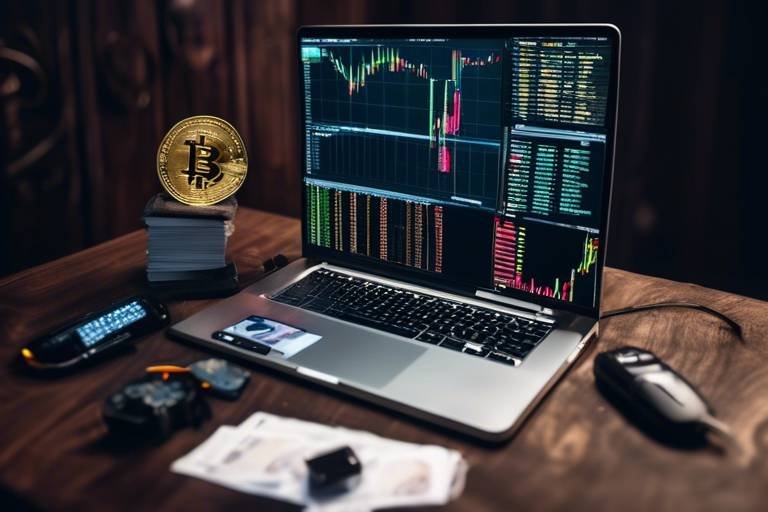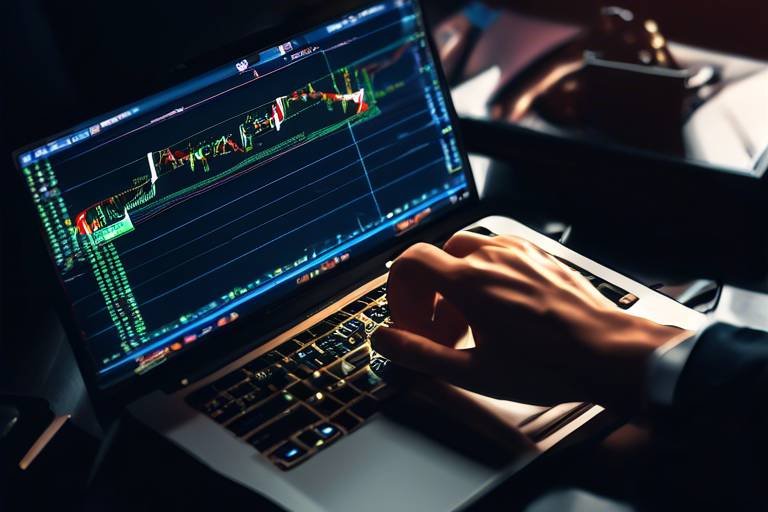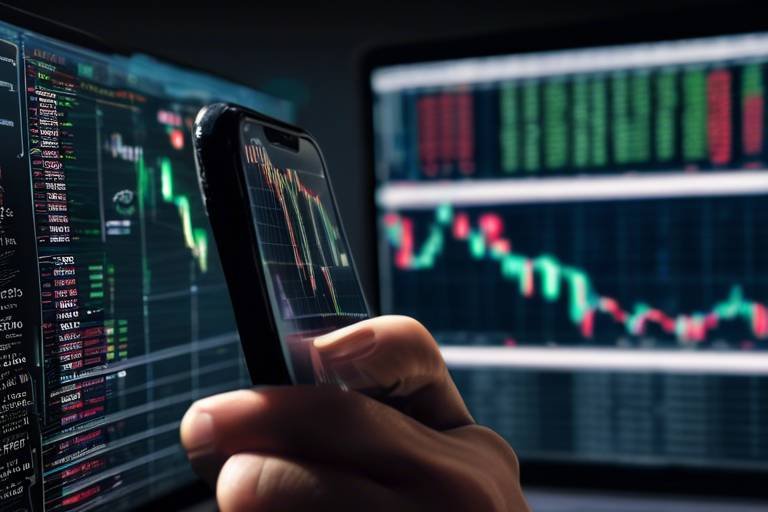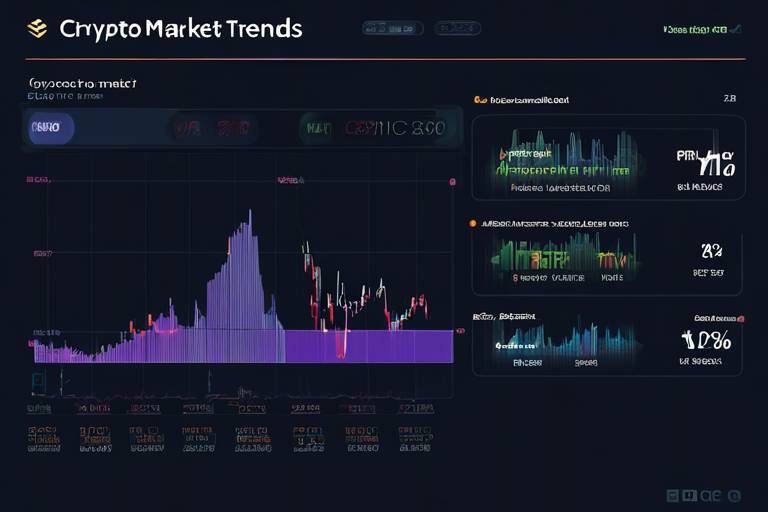Understanding the Risks of Holding Cryptocurrencies
In the fast-paced world of digital currencies, holding cryptocurrencies can feel like riding a roller coaster—thrilling yet terrifying. The allure of potential profits can be tempting, but it's essential to understand that the landscape is fraught with risks. From the dizzying heights of market volatility to the lurking shadows of security vulnerabilities, the challenges are numerous. This article will guide you through the myriad risks associated with holding cryptocurrencies, helping you navigate this complex environment with more confidence.
When it comes to cryptocurrencies, price swings can be as dramatic as a plot twist in your favorite thriller. One moment, you might be celebrating a significant gain, and the next, you could be staring at a steep loss. The volatility is driven by various factors, including market sentiment, regulatory news, and even technological developments. Understanding these elements can empower you to make informed decisions. For example, did you know that even tweets from influential figures can cause price spikes or drops? This unpredictability means that investors must be prepared for the ups and downs, often requiring a well-thought-out investment strategy.
The digital nature of cryptocurrencies means that they are not immune to threats. Hacking and theft are real dangers that can wipe out your holdings in an instant. It’s crucial to be aware of common security risks and adopt best practices to protect your assets. For instance, many investors opt to store their cryptocurrencies on exchanges, which can be vulnerable to cyberattacks. Choosing reputable exchanges with strong security measures is vital. But, what if you could take your security a step further?
Storing your cryptocurrencies on an exchange might feel convenient, but it’s akin to leaving your valuables in a glass case. While some exchanges are fortified with advanced security protocols, others may not prioritize safety, making them easy targets for hackers. Always research and select exchanges that demonstrate a commitment to security. Look for features like insurance against losses and user reviews that highlight their reliability. Remember, your assets are only as safe as the platform you choose to store them on.
To enhance security for long-term holdings, consider cold storage solutions such as hardware wallets. These devices store your cryptocurrencies offline, making them significantly less susceptible to online threats. It’s like having a safe deposit box for your digital assets! Cold storage allows you to keep your private keys away from prying eyes and hackers. The peace of mind that comes with knowing your investments are secure is invaluable.
Implementing two-factor authentication (2FA) is another effective way to bolster your security. Think of it as a double lock on your front door. With 2FA, even if someone manages to get your password, they would still need a second form of verification to access your account. This could be a text message code or an authentication app. It’s a simple step that can dramatically reduce the risk of unauthorized access to your cryptocurrency accounts.
Smart contracts are an exciting innovation in the blockchain ecosystem, but they come with their own set of vulnerabilities. These self-executing contracts can contain bugs or flaws that could be exploited by malicious actors. It’s essential to conduct thorough audits of any smart contracts you plan to use or invest in. By understanding and mitigating these risks, you can protect yourself from potential pitfalls in this emerging technology.
The regulatory landscape for cryptocurrencies is like a moving target—constantly evolving and often unpredictable. Governments worldwide are working to establish frameworks that can govern the use and trading of digital currencies. As an investor, it’s crucial to stay informed about these changes, as they can have significant implications for your holdings. Regulatory decisions can affect everything from market access to taxation, and being caught off guard could lead to unexpected challenges.
Understanding the tax obligations related to cryptocurrency transactions is vital for investors. In many jurisdictions, cryptocurrencies are treated as property, which means that capital gains tax may apply when you sell or exchange them. Keeping accurate records of your transactions can save you headaches come tax season. It’s wise to consult with a tax professional who understands the nuances of cryptocurrency taxation to ensure compliance and avoid penalties.
Non-compliance with regulations can lead to significant penalties, which can be detrimental to your investment. As regulations change, staying informed is essential. This means regularly checking for updates from regulatory bodies and ensuring that you adhere to any new requirements. By being proactive, you can protect your investments and avoid the stress that comes with regulatory issues.
- What are the main risks of holding cryptocurrencies? The primary risks include market volatility, security vulnerabilities, and regulatory challenges.
- How can I secure my cryptocurrency investments? Use cold storage solutions, enable two-factor authentication, and choose reputable exchanges.
- Are there tax implications for cryptocurrency transactions? Yes, many jurisdictions treat cryptocurrencies as property, which may incur capital gains tax.
- What should I do if I suspect my exchange has been hacked? Immediately withdraw your assets to a secure wallet and report the incident to the exchange.

Market Volatility
Cryptocurrencies are infamous for their extreme price fluctuations, which can leave even the most seasoned investors feeling dizzy. Imagine riding a roller coaster that never quite stops—one moment you're soaring high, and the next, you're plummeting down. This unpredictability is primarily driven by a combination of factors, including market sentiment, regulatory news, technological advancements, and macroeconomic events. Understanding these elements can empower investors to navigate the turbulent waters of the crypto market.
One of the biggest contributors to market volatility is speculation. Many investors are attracted to cryptocurrencies due to the potential for high returns, leading to a surge in buying activity. However, this speculative nature can also result in rapid sell-offs, causing prices to plummet. For instance, when a popular cryptocurrency experiences a sudden dip, panic selling can ensue, further exacerbating the situation. It's a vicious cycle that can turn a promising investment into a nightmare in mere hours.
Another factor at play is news and events. The cryptocurrency market is incredibly sensitive to news, whether it's a major exchange hack, regulatory changes, or even social media trends. For example, a tweet from a prominent figure can send prices soaring or crashing within minutes. This susceptibility to news is a double-edged sword; while it can create opportunities for profit, it also poses significant risks for those who are not paying close attention.
To illustrate the impact of market volatility, consider the following table that outlines the price movements of a popular cryptocurrency over a week:
| Date | Opening Price | Closing Price | Price Change (%) |
|---|---|---|---|
| Monday | $40,000 | $42,500 | +6.25% |
| Tuesday | $42,500 | $39,000 | -8.82% |
| Wednesday | $39,000 | $41,000 | +5.13% |
| Thursday | $41,000 | $38,500 | -3.66% |
| Friday | $38,500 | $43,000 | +11.69% |
| Saturday | $43,000 | $41,000 | -4.65% |
| Sunday | $41,000 | $44,000 | +7.31% |
This table clearly shows how quickly prices can change, highlighting the necessity for investors to remain vigilant. But how can one manage the risks associated with such volatility? Here are a few strategies:
- Diversification: Don't put all your eggs in one basket. By spreading your investments across different cryptocurrencies, you can mitigate the risks associated with a single asset.
- Setting Stop-Loss Orders: These orders automatically sell your assets when they reach a certain price, helping to minimize losses during downturns.
- Staying Informed: Keeping up with news and market trends can help you make timely decisions, potentially reducing the impact of sudden market movements.
In conclusion, while the volatility of cryptocurrencies can be daunting, it also presents unique opportunities for those willing to embrace the risks. By understanding the underlying factors that drive price fluctuations and implementing sound investment strategies, you can navigate this thrilling but unpredictable landscape with greater confidence.

Security Vulnerabilities
In the world of cryptocurrencies, security is a paramount concern. The digital nature of these assets means that they are vulnerable to a variety of threats, including hacking, phishing, and other forms of cybercrime. Imagine holding a treasure chest filled with gold coins, but instead of being locked away in a vault, it’s sitting out in the open, vulnerable to anyone who wants to take a swing at it. This is essentially what it feels like to hold cryptocurrencies without proper security measures in place.
One of the most significant risks comes from the platforms where cryptocurrencies are stored and traded. Many investors opt to keep their assets on exchanges, which can be convenient but also risky. These exchanges are often prime targets for cyberattacks due to the large amounts of cryptocurrency they hold. According to a recent study, over 70% of cryptocurrency exchanges have experienced some form of security breach. This statistic should send chills down the spine of any investor. So, how can one safeguard their digital assets?
To mitigate these risks, it’s crucial to adopt best practices for securing your cryptocurrency holdings. Here are some essential strategies:
- Use Reputable Exchanges: Always choose exchanges with a proven track record of security. Research their history, read reviews, and ensure they have robust security measures in place.
- Enable Two-Factor Authentication (2FA): This adds an extra layer of security by requiring not only your password but also a second form of verification, such as a text message or an authentication app.
- Consider Cold Storage: For long-term holdings, cold storage solutions like hardware wallets are highly recommended. They keep your assets offline and away from potential threats.
Now, let’s dive deeper into cold storage solutions. These options are like a safe deposit box for your cryptocurrencies. Hardware wallets, for instance, store your private keys offline, making them virtually immune to online hacks. They are user-friendly and come with various features that enhance security, such as recovery phrases and PIN codes. By using a hardware wallet, you can sleep soundly knowing your investments are safeguarded.
As mentioned, keeping your cryptocurrencies on exchanges can be a double-edged sword. While it offers convenience for trading, it also exposes you to significant risks. Many exchanges have been hacked in the past, resulting in the loss of millions of dollars worth of digital assets. For example, the infamous Mt. Gox hack led to the loss of approximately 850,000 Bitcoins, a staggering amount that still haunts the crypto community today. This incident serves as a reminder of the importance of not keeping large sums of cryptocurrency on exchanges.
Cold storage options, such as hardware wallets, provide enhanced security for long-term holdings. These wallets are not connected to the internet, making them far less susceptible to hacking attempts. Imagine storing your valuables in a safe that no one can access unless they have the key. That’s the kind of security cold storage offers. Popular hardware wallets include Ledger and Trezor, both of which have strong reputations in the industry.
Implementing two-factor authentication (2FA) is another vital step in protecting your cryptocurrency accounts. It acts like a double lock on your front door; even if someone manages to get your password, they still need a second form of identification to access your account. This can be a text message sent to your phone or a code generated by an authentication app. The added security that 2FA provides is invaluable, especially in today’s digital landscape where cyber threats are rampant.
Smart contracts, while revolutionary, can also introduce vulnerabilities into the blockchain ecosystem. These self-executing contracts rely on code, and if that code has flaws, it can be exploited by malicious actors. Investors should be cautious and conduct thorough due diligence before engaging with projects that utilize smart contracts. Regular audits and security checks can help mitigate these risks, ensuring that your investments are not only promising but also secure.
In conclusion, while the allure of cryptocurrencies is undeniable, it’s crucial to remain vigilant about security vulnerabilities. By implementing robust security measures, choosing reputable exchanges, and considering cold storage solutions, you can significantly reduce the risks associated with holding cryptocurrencies. Remember, in the world of digital assets, staying informed and proactive is your best defense.
Q1: What are the best practices for securing my cryptocurrency?
A1: Always use reputable exchanges, enable two-factor authentication, and consider using cold storage options like hardware wallets for long-term holdings.
Q2: How can I tell if an exchange is secure?
A2: Research the exchange’s history, read user reviews, and check if they have a comprehensive security policy in place.
Q3: What is the risk of using smart contracts?
A3: Smart contracts can have vulnerabilities in their code, making them susceptible to exploitation. Always conduct thorough audits before engaging with them.

Exchange Risks
When it comes to investing in cryptocurrencies, one of the most significant risks you face is the potential dangers associated with cryptocurrency exchanges. Think of these exchanges as the bustling marketplaces of the digital currency world, where buyers and sellers converge. However, just like any marketplace, they can be vulnerable to various threats. Cybercriminals are always on the lookout for weaknesses, and unfortunately, many exchanges have fallen victim to hacking incidents. In fact, according to reports, billions of dollars worth of cryptocurrencies have been stolen from exchanges over the years, making it crucial for investors to be aware of these risks.
So, what exactly are these risks? First and foremost, the security of the exchange itself is paramount. Not all exchanges are created equal; some have robust security measures in place, while others may cut corners. It’s essential to conduct thorough research before choosing an exchange. Look for platforms that have a solid reputation, transparent security protocols, and a history of safeguarding user funds. Here are a few key factors to consider:
- Reputation: Check reviews and feedback from other users.
- Security Features: Investigate the security measures they have in place, such as encryption and cold storage.
- Insurance Policies: Some exchanges offer insurance for user funds in case of a breach.
Moreover, many investors mistakenly believe that simply storing their assets on an exchange is a safe bet. This is a common misconception. While it may be convenient, keeping your cryptocurrencies on an exchange is akin to leaving your cash in a public place; it’s just not safe. If an exchange is hacked, you could lose your entire investment in a matter of seconds. Therefore, it's wise to consider alternative storage solutions, which we will delve into later in this article.
Another risk to consider is the regulatory landscape surrounding exchanges. With governments worldwide tightening regulations on cryptocurrencies, exchanges may face sudden changes that can impact their operations. For instance, an exchange might be forced to halt trading or even shut down due to regulatory compliance issues. This uncertainty can be incredibly stressful for investors, who may find their assets frozen or inaccessible at a critical time.
In summary, while cryptocurrency exchanges offer a convenient way to buy and sell digital assets, they come with inherent risks that investors must navigate carefully. Always prioritize security, stay informed about regulatory changes, and consider using more secure storage options for your assets. By being proactive and educated, you can significantly reduce your exposure to these risks and protect your investments in the ever-evolving world of cryptocurrencies.
Here are some common questions that investors often have regarding exchange risks:
- What should I look for in a cryptocurrency exchange? Look for a reputable exchange with strong security measures, positive user reviews, and transparent policies.
- Is it safe to keep my cryptocurrencies on an exchange? Generally, it is safer to transfer your assets to a secure wallet rather than keeping them on an exchange.
- How can I protect my account from hacks? Implement two-factor authentication, use strong passwords, and be cautious of phishing attempts.

Cold Storage Solutions
When it comes to safeguarding your cryptocurrency, are often considered the gold standard. Unlike hot wallets, which are connected to the internet and therefore more vulnerable to hacks, cold storage keeps your assets offline, making it significantly harder for cybercriminals to access them. Imagine your cryptocurrencies as valuable treasures; would you keep them in a glass case on the street or in a secure vault? Cold storage is like that vault, providing an extra layer of security for your digital assets.
There are several types of cold storage options available, each with its own set of advantages and disadvantages. The most popular cold storage methods include:
- Hardware Wallets: These are physical devices that store your private keys offline. They are compact and user-friendly, making them an excellent choice for both beginners and experienced investors. Brands like Ledger and Trezor have gained popularity due to their robust security features.
- Paper Wallets: This method involves printing your private keys and public addresses on a piece of paper. While it sounds simple, it requires careful handling to avoid loss or damage. Paper wallets can be an effective cold storage solution if created correctly, but they come with their own risks, such as physical theft or destruction.
- Air-Gapped Computers: This is a more advanced option where you use a computer that has never been connected to the internet to generate and store your keys. It’s highly secure but requires technical knowledge to set up and maintain.
Choosing the right cold storage solution depends on your individual needs and comfort level with technology. For instance, if you’re someone who frequently trades, a hardware wallet might be more suitable due to its convenience and security features. On the other hand, if you’re a long-term holder looking to minimize exposure to risks, a paper wallet or air-gapped computer could be the way to go.
It’s also essential to remember that while cold storage significantly reduces the risk of online theft, it does not eliminate all risks. For example, if you lose your hardware wallet or paper wallet, retrieving your assets can be nearly impossible without backup recovery phrases. Therefore, always ensure that you maintain secure backups and understand the recovery process before committing to any cold storage method.
In summary, cold storage solutions are a vital component of a comprehensive cryptocurrency security strategy. By choosing the right method and implementing best practices, you can protect your digital assets from the myriad of threats that exist in the online world.
What is cold storage for cryptocurrencies?
Cold storage refers to keeping cryptocurrency offline to protect it from unauthorized access and cyberattacks. This can be done using hardware wallets, paper wallets, or air-gapped computers.
Are cold storage solutions completely safe?
While cold storage significantly reduces the risk of online theft, it's not entirely risk-free. Loss of the storage medium or failure to create secure backups can lead to permanent loss of assets.
How do I choose the right cold storage solution?
Consider your trading habits, technical expertise, and the amount of cryptocurrency you hold. Hardware wallets are user-friendly for most, while paper wallets or air-gapped computers may be better for long-term holding.

Two-Factor Authentication
In the world of cryptocurrencies, security is paramount. One of the most effective ways to bolster your security is through Two-Factor Authentication (2FA). This method adds an extra layer of protection to your accounts, making it significantly harder for unauthorized users to gain access. But what exactly is 2FA, and why is it so crucial for cryptocurrency holders?
Essentially, 2FA requires two forms of identification before granting access to your account. The first step usually involves your password, something you know. The second step is typically something you have, such as a smartphone app that generates a time-sensitive code. This dual requirement means that even if someone manages to steal your password, they would still need that second piece of information to access your account.
Imagine you’re trying to enter a high-security vault. You have the key (your password), but there’s also a biometric scanner that requires your fingerprint. Without both, you simply can’t get in. This is the essence of 2FA. It’s a security measure that can make a world of difference, especially in an environment where hacking attempts are rampant.
There are several methods of implementing 2FA, and here are a few popular options:
- Authenticator Apps: Applications like Google Authenticator or Authy generate a unique code every 30 seconds. You’ll need to enter this code along with your password to log in.
- SMS Codes: Some platforms send a text message with a code to your registered mobile number. While convenient, this method can be vulnerable to SIM swapping attacks.
- Email Codes: Similar to SMS, a code is sent to your email. However, if your email account is compromised, this method loses its effectiveness.
While 2FA is a robust security measure, it’s not foolproof. Always remember to keep your recovery codes in a safe place, as losing access to your 2FA method can lock you out of your account. Moreover, be wary of phishing attempts that can trick you into providing your 2FA code. Always verify the source before entering any sensitive information.
In conclusion, enabling Two-Factor Authentication is a simple yet powerful way to enhance the security of your cryptocurrency holdings. It acts as a formidable barrier against unauthorized access, ensuring that you have peace of mind while navigating the digital asset landscape.
1. What is Two-Factor Authentication?
2FA is a security process that requires two forms of identification before granting access to an account. This usually includes something you know (like a password) and something you have (like a smartphone app).
2. Why should I use 2FA for my cryptocurrency accounts?
Using 2FA significantly reduces the risk of unauthorized access, making it much harder for hackers to compromise your accounts.
3. Can I rely solely on 2FA for my security?
While 2FA adds an essential layer of protection, it's crucial to combine it with other security measures, such as strong passwords and regular account monitoring.
4. What should I do if I lose access to my 2FA method?
Keep your recovery codes in a secure location. If you lose access, contact the service provider for assistance in recovering your account.

Smart Contract Risks
Smart contracts are often hailed as the revolutionary backbone of blockchain technology, allowing for self-executing agreements that eliminate the need for intermediaries. However, with great innovation comes significant risk. One of the most pressing concerns is that smart contracts can be susceptible to coding errors and vulnerabilities. These flaws can lead to unintended consequences, including the loss of funds or the exploitation of the contract by malicious actors.
Imagine a smart contract as a vending machine: you put in your money and expect a product in return. But what if the machine is faulty? You might end up losing your cash without receiving anything in return. Similarly, a small bug in a smart contract can result in catastrophic financial losses. For instance, the infamous DAO hack in 2016 exploited a vulnerability in a smart contract, leading to the loss of over $50 million worth of Ether. This incident serves as a stark reminder that while smart contracts are designed to be trustless and secure, they are not infallible.
Another risk associated with smart contracts is the potential for external attacks. Since these contracts often interact with other contracts and systems, a vulnerability in one area can compromise the entire ecosystem. For example, if a smart contract relies on external data feeds or oracles, any flaws in those sources can trigger unintended actions within the contract. This interconnectedness creates a complex web of dependencies that can be difficult to navigate and secure.
To mitigate these risks, it's essential for developers to engage in rigorous auditing and testing of smart contracts before deployment. This process involves a thorough examination of the code to identify and rectify potential vulnerabilities. Additionally, utilizing established frameworks and best practices can significantly enhance the security of smart contracts. Here are a few strategies to consider:
- Code Reviews: Regularly review and update the code to address any emerging vulnerabilities.
- Formal Verification: Use mathematical proofs to ensure the correctness of the contract's logic.
- Bug Bounty Programs: Encourage ethical hackers to find and report vulnerabilities in exchange for rewards.
In conclusion, while smart contracts offer exciting possibilities for automating and securing transactions, they come with inherent risks that cannot be ignored. Investors and developers must remain vigilant, continuously educating themselves about potential vulnerabilities and implementing robust security measures to safeguard their assets. As the blockchain landscape evolves, understanding these risks will be crucial in navigating the complex world of cryptocurrencies.
Q: What is a smart contract?
A: A smart contract is a self-executing contract with the terms of the agreement directly written into code on the blockchain.
Q: How can I protect myself from smart contract risks?
A: To protect yourself, ensure that you only interact with well-audited contracts, stay informed about security practices, and consider using platforms with a strong reputation.
Q: What should I do if I suspect a vulnerability in a smart contract?
A: If you suspect a vulnerability, it’s advisable to report it to the developers or the platform hosting the contract, and avoid interacting with it until it has been verified as secure.

Regulatory Challenges
When it comes to cryptocurrencies, navigating the regulatory landscape can feel like trying to find your way through a maze blindfolded. The rules are constantly changing, and what might be acceptable today could be outlawed tomorrow. This uncertainty can create a lot of anxiety for investors who are trying to make sense of their holdings and the legal implications surrounding them.
One of the primary regulatory challenges is the lack of a unified approach across different countries. While some nations have embraced cryptocurrencies and created frameworks to regulate them, others have taken a much more cautious stance, outright banning them. This patchwork of regulations means that investors need to be vigilant and stay informed about the laws in their own countries, as well as in the countries where their exchanges operate.
Furthermore, regulatory bodies are increasingly focusing on anti-money laundering (AML) and know your customer (KYC) regulations. These requirements compel exchanges to verify the identities of their users, which can be a double-edged sword. On one hand, these measures can help prevent fraud and protect investors, but on the other hand, they can lead to a loss of privacy and make it harder for individuals to engage in transactions without being tracked.
Another significant concern is the potential for tax implications. Many investors are unaware that their cryptocurrency transactions could be subject to taxation. For instance, in several jurisdictions, trading one cryptocurrency for another is considered a taxable event. This means that if you swapped Bitcoin for Ethereum, you could owe taxes on any capital gains from that trade, even if you didn't convert your crypto to cash. Understanding these tax obligations is crucial to avoid unexpected penalties.
To give you a clearer picture, here's a brief overview of some common regulatory challenges:
| Challenge | Description |
|---|---|
| Regulatory Uncertainty | Inconsistent regulations across jurisdictions can confuse investors. |
| AML/KYC Compliance | Regulations require exchanges to verify user identities, impacting privacy. |
| Tax Obligations | Transactions may be taxable events, leading to potential liabilities. |
Lastly, the importance of compliance cannot be overstated. Non-compliance with regulations can lead to hefty fines and even legal action, which could jeopardize your investments. Therefore, it’s essential to stay informed about the evolving regulatory landscape. Regularly check updates from your local regulatory bodies or consult with a financial advisor who specializes in cryptocurrency. By being proactive, you can safeguard your investments against regulatory pitfalls.
- What are the main regulatory challenges for cryptocurrency investors? The main challenges include regulatory uncertainty, AML/KYC compliance requirements, and tax obligations.
- How can I stay informed about regulatory changes? Regularly check updates from local regulatory bodies and consider consulting a financial advisor who specializes in cryptocurrencies.
- What are the tax implications of trading cryptocurrencies? In many jurisdictions, trading one cryptocurrency for another is considered a taxable event, which may result in capital gains taxes.
- What happens if I don't comply with regulations? Non-compliance can lead to significant penalties, including fines and legal action.

Tax Implications
When diving into the world of cryptocurrencies, one crucial aspect that often gets overlooked is the associated with buying, selling, and trading these digital assets. Unlike traditional currencies, cryptocurrencies are treated as property by most tax authorities, which means that any gains or losses from transactions can have significant tax consequences. Imagine you bought Bitcoin for $1,000 and later sold it for $5,000. That $4,000 profit is not just a windfall; it's also a taxable event. Understanding how these transactions are taxed can help you avoid unpleasant surprises come tax season.
In many jurisdictions, including the United States, the Internal Revenue Service (IRS) requires taxpayers to report their cryptocurrency transactions. This can include not only sales but also exchanges between different cryptocurrencies. It’s essential to keep meticulous records of your transactions, including dates, amounts, and the value of the cryptocurrency at the time of the transaction. Failing to report these transactions can lead to hefty penalties.
Here are some important tax considerations you should keep in mind:
- Capital Gains Tax: If you sell your cryptocurrency at a profit, you will likely owe capital gains tax. The rate can vary based on how long you held the asset—short-term gains (assets held for less than a year) are typically taxed at your ordinary income tax rate, while long-term gains (held for over a year) may be taxed at a lower rate.
- Losses: On the flip side, if you sell your cryptocurrency at a loss, you may be able to use that loss to offset other capital gains, which can reduce your overall tax liability.
- Mining Income: If you're involved in mining cryptocurrencies, the coins you earn are considered income and are subject to taxation at their fair market value at the time you receive them.
Another layer of complexity arises when considering the reporting requirements. Many countries have specific forms and guidelines for reporting cryptocurrency transactions. For instance, in the U.S., taxpayers must report their cryptocurrency holdings on Form 8949 and Schedule D. Some investors may find it beneficial to consult with a tax professional who understands the nuances of cryptocurrency taxation to ensure compliance and optimize their tax situation.
Moreover, the landscape of cryptocurrency taxation is continually evolving. As governments around the world grapple with how to regulate this burgeoning market, new rules and guidelines are likely to emerge. Staying informed about these changes is crucial for any investor looking to navigate the complex world of cryptocurrency taxation effectively.
In summary, understanding the tax implications of your cryptocurrency activities is not just a matter of compliance; it's a vital part of your investment strategy. By keeping accurate records and staying informed about the tax landscape, you can make more informed decisions and potentially save yourself from future headaches.
Q1: Do I have to pay taxes on cryptocurrency transactions?
A1: Yes, in most jurisdictions, you are required to pay taxes on any gains from cryptocurrency transactions, as they are treated as property.
Q2: How do I report cryptocurrency on my taxes?
A2: You typically report cryptocurrency transactions on specific tax forms, such as Form 8949 and Schedule D in the U.S. It’s advisable to keep detailed records of all your transactions.
Q3: What happens if I don’t report my cryptocurrency earnings?
A3: Failing to report your earnings can lead to penalties, fines, and potentially legal action from tax authorities.
Q4: Can I deduct losses from cryptocurrency investments?
A4: Yes, you can use losses from your cryptocurrency investments to offset gains, which may reduce your overall tax liability.

Compliance Risks
Compliance risks in the cryptocurrency realm are like navigating a minefield; one wrong step can lead to significant consequences. As the regulatory landscape continues to shift and evolve, investors must remain vigilant and informed about the rules governing their digital assets. Failure to comply with regulations can result in hefty fines, legal troubles, or even the loss of your investment. So, how can you protect yourself from these compliance risks? Let's dive deeper.
Firstly, it’s essential to understand that regulations vary widely across different jurisdictions. What might be legal in one country could be illegal in another. For example, some nations have embraced cryptocurrencies and established clear guidelines, while others have imposed strict bans. This inconsistency can create confusion for investors. Therefore, keeping abreast of the regulatory environment in your country and any countries where you might conduct transactions is crucial.
Moreover, many countries are increasingly focusing on Anti-Money Laundering (AML) and Know Your Customer (KYC) regulations. These rules require exchanges and wallets to verify the identity of their users to prevent illicit activities. Not adhering to these regulations can lead to account suspensions or closures. Here are some key points to consider:
- Stay Informed: Regularly check for updates on local regulations regarding cryptocurrency.
- Documentation: Keep thorough records of your transactions to ensure compliance with tax and reporting requirements.
- Choose Wisely: Select exchanges and platforms that prioritize regulatory compliance to minimize risks.
Furthermore, as governments tighten their grip on the cryptocurrency market, they may introduce new regulations that could affect your holdings. For instance, some countries are considering imposing taxes on unrealized gains, which means you could be taxed even if you haven't sold your assets. This potential shift highlights the importance of understanding tax implications and preparing for them ahead of time.
Lastly, non-compliance can lead not only to financial penalties but also to reputational damage. If you’re found to be violating regulations, it could harm your standing in the crypto community and deter potential investors or partners. Therefore, staying compliant isn't just about avoiding fines; it's about maintaining your credibility and trustworthiness in the ever-evolving world of cryptocurrencies.
In conclusion, while the allure of cryptocurrencies can be tempting, the compliance risks are real and should not be taken lightly. By staying informed, keeping meticulous records, and choosing compliant platforms, you can navigate the regulatory landscape more safely and effectively. Remember, in the world of crypto, knowledge is power, and compliance is key to safeguarding your investments.
- What are compliance risks in cryptocurrency? Compliance risks refer to the potential legal consequences of failing to adhere to regulations governing cryptocurrency transactions and holdings.
- How can I stay compliant with cryptocurrency regulations? Regularly check local laws, maintain thorough records of transactions, and choose reputable exchanges that follow regulatory guidelines.
- What happens if I don't comply with regulations? Non-compliance can result in fines, legal issues, and even the loss of your cryptocurrency assets.
Frequently Asked Questions
- What are the main risks associated with holding cryptocurrencies?
Holding cryptocurrencies comes with several risks, including market volatility, which can lead to significant price fluctuations, and security vulnerabilities, such as hacking and theft. Additionally, regulatory challenges and psychological factors can impact your investment decisions.
- How can I protect my cryptocurrencies from theft?
To safeguard your cryptocurrencies, consider using cold storage solutions like hardware wallets, which keep your assets offline and away from hackers. Additionally, implementing two-factor authentication (2FA) on your accounts adds an extra layer of security, making it harder for unauthorized users to access your crypto.
- Are cryptocurrency exchanges safe?
While some exchanges are reputable and secure, many have been targets for cyberattacks. It's essential to do your research and choose exchanges with strong security measures in place. Always consider withdrawing your assets to a secure wallet rather than leaving them on the exchange.
- What are smart contract risks?
Smart contracts can introduce vulnerabilities into the blockchain ecosystem, such as coding errors or exploits. To mitigate these risks, it's crucial to only use well-audited smart contracts and platforms with a good track record.
- How does cryptocurrency taxation work?
Cryptocurrency taxation can be complex, as it varies by jurisdiction. Generally, any profits made from buying and selling cryptocurrencies may be subject to capital gains tax. It's important to keep accurate records of your transactions and consult a tax professional for guidance on your specific situation.
- What happens if I don’t comply with cryptocurrency regulations?
Failure to comply with cryptocurrency regulations can lead to significant penalties, including fines or legal action. Staying informed about the latest regulatory changes is vital to ensure that you remain compliant and protect your investments.
- How can I stay updated on cryptocurrency regulations?
To stay updated on cryptocurrency regulations, follow reputable news sources, subscribe to industry newsletters, and join online forums or communities. Engaging with other investors can also provide valuable insights into the regulatory landscape.



















